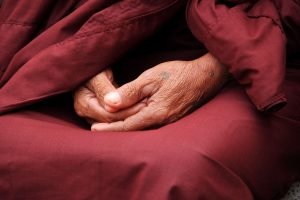Tags

Mindfulness
It is a mistake to think that being Buddhist means you must meditate. In fact the Buddha mainly kept meditation instruction for his closest followers and monks. He very rarely taught meditation to lay followers.
This wasn’t because he thought they would not understand, or not benefit from the pratices, it was because he knew that they had too many wordly concerns to be able to put in enough time for meditation to have it’s desired effects.
The Buddha taught Right Living to lay people, villagers and the like. Compassion, loving kindness, correct methods for resolving disputes. These are all genuine Buddhist practices that benefit all who practice them and all those around them. Right livelyhood is a big one. Earn your living honestly and with care. Dishonesty leads to suffering, Dukkha, for all involved. The dishonest person may not seem to suffer immediately, but they will, either in their current lifetime or a future one.
Causing no harm to any sentient being is also another important teaching for the lay observer. All sentient beings suffer in some way or another, and deserve our compassion and care. This reminds me of the Wiccan Rede. “An it harm none, do what thou wilt”. It may seem to be a licence to do what you want, but you just try living your life without harming anything at all! It is far more difficult (almost impossible) than you may think.
So, you can definitely be Buddhist and not meditate. Don’t get me wrong, meditation leads you along the path far more quickly than if you do not meditate, but you do not have to, to be a Buddhist. Just try to follow the Five Precepts of the lay follower, and you will be doing very well.
The Five Moral Precepts are refraining from:
• harming living things.
• taking what is not given (stealing).
• sexual misconduct (adultery etc).
• lying or gossip.
• taking intoxicating substances (drugs or alcohol).
At the end of the day, those 5 precepts are no too demanding. Be honest, be sober, don’t put it about too much and don’t spread gossip. The main one is do no harm to living beings, which is why many Buddhists choose to be vegetarian, but the Buddha never taught vegetarianism, and he often ate meat himself, so that is purely a lifestyle choice should you wish to persue it.
The five precepts are an excellent start on your Buddhist path. Mindfulness and Metta meditation can come later should you so wish, but it is not necessary, nor is it written in stone. Basically the requirements are to be honest, nice, responsible and caring! No bad thing if everyone were to abide by it.
Namaste
